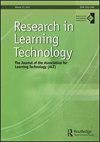The seven principles of online learning: Feedback from faculty and alumni on its importance for teaching and learning
IF 1.2
Q2 EDUCATION & EDUCATIONAL RESEARCH
引用次数: 104
Abstract
Effective online teaching and learning requires a carefully designed classroom that promotes student engagement with faculty, peers and course content. This research included an investigation of the importance of faculty–student communication and collaboration; student–student communication and collaboration; active learning techniques; prompt feedback; appropriate time for tasks; high performance expectations; and respect for diverse learning styles (preferences) (Chickering and Ehrmann 1996) to faculty in their online teaching and to alumni in their online learning. The participants were 14 college faculty and 111 alumni, from the same graduate program. A 45-item Likert survey and two open-ended questions were presented to the participants to explore the important factors contributing to their online teaching and learning. The results demonstrated that holding students to high standards of performance, academic honesty and professional conduct was the most important factor to both faculty in their online teaching and alumni in their online learning. Additionally, alumni valued engagement with their faculty more than engagement with other students or course content. Students need an online instructor who is organised and communicative in the online classroom, and faculty need a solidly designed online classroom, with engaged students who are timely in their work. An analysis of the findings with specific application to online teaching and learning is presented in this article.在线学习的七项原则:教师和校友对在线学习对教学重要性的反馈
有效的在线教学需要一个精心设计的教室,以促进学生与教师、同学和课程内容的互动。本研究包括调查师生沟通与合作的重要性;学生之间的沟通与协作;主动学习技巧;及时反馈;适当的时间完成任务;高绩效期望;尊重不同的学习方式(偏好)(Chickering and Ehrmann 1996),尊重在线教学中的教师和在线学习中的校友。参与者是来自同一研究生项目的14名大学教员和111名校友。一份45项李克特调查和两个开放式问题被呈现给参与者,以探索影响他们在线教学和学习的重要因素。结果表明,对教师和校友来说,让学生达到高标准的表现、学术诚信和职业操守是在线教学中最重要的因素。此外,校友更重视与教师的互动,而不是与其他学生或课程内容的互动。学生需要一个在在线课堂上有组织和交流的在线讲师,教师需要一个设计牢固的在线课堂,学生们参与其中,及时完成他们的工作。本文对研究结果进行了分析,并将其具体应用于在线教学。
本文章由计算机程序翻译,如有差异,请以英文原文为准。
求助全文
约1分钟内获得全文
求助全文
来源期刊

Research in Learning Technology
EDUCATION & EDUCATIONAL RESEARCH-
CiteScore
6.50
自引率
0.00%
发文量
13
审稿时长
20 weeks
 求助内容:
求助内容: 应助结果提醒方式:
应助结果提醒方式:


